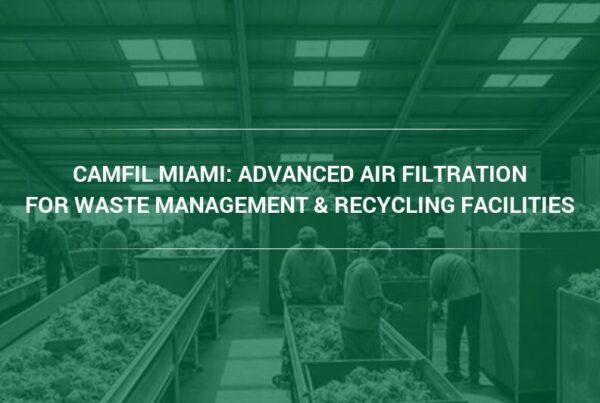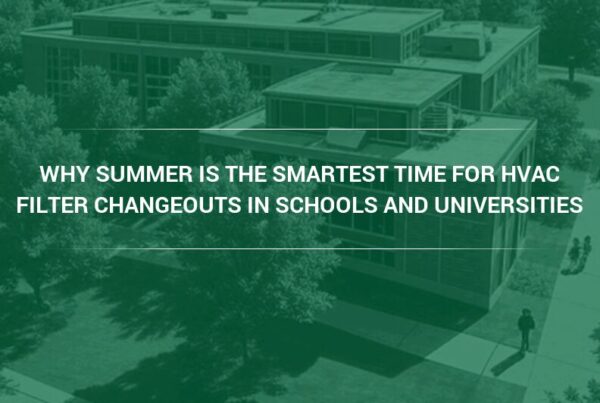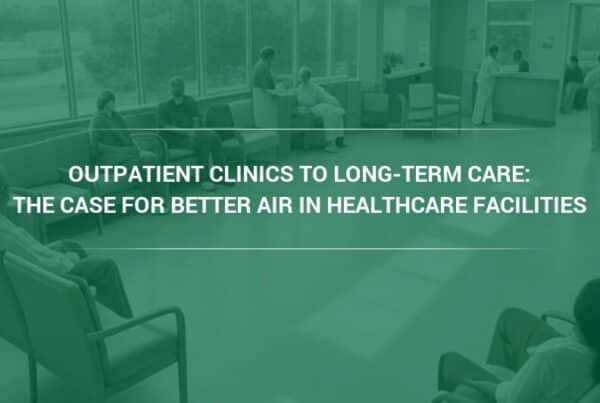In the world of commercial buildings and facilities management, ensuring optimal indoor air quality (IAQ) is not just a matter of comfort—it’s a crucial health and efficiency concern. Air filters are an essential part of maintaining a healthy indoor environment in public and commercial buildings; in addition to protecting the lungs of building occupants from dangerous air pollutants, the right air filters help support the health and efficiency of commercial HVAC systems. They are the first line of defense against pollutants and particulates that compromise indoor air quality. For facilities that prioritize public air quality, such as hospitals, schools, and office buildings, choosing the right air filter can have profound implications for occupant health and system performance.
With building managers continuously seeking ways to improve air quality in commercial buildings, the choice between premium panel filters and cheaper budget panel filters becomes highly significant. This guide aims to shed light on this choice, emphasizing the importance of selecting the right filters for your HVAC systems.
Premium Panel Filters vs. Cheap Panel Filters: A Comparative Analysis
Definition and Purpose of Panel Filters
Panel filters are designed to remove larger particles from the air, such as visible dust and pollen. They serve not only to protect the HVAC system’s components but also to improve the performance and extend the service life of any higher efficiency filters downstream in multistage HVAC systems. The occupants, employees, and visitors who walk through the doors of a commercial building deserve cleaner air to breathe and the proper use of panel filters will improve the quality of the air circulating within that building.
Filter Media Quality
Premium panel filters are constructed with higher-quality materials designed for durability and efficiency. They often feature advanced filtration media that can capture a wider range of particulates without restricting airflow. In contrast, cheap panel filters typically use lower-grade materials that may not filter as effectively, potentially allowing more pollutants to pass through and recirculate within the building.
Construction Differences
The differences in design and construction between premium and cheap air filters are significant and impact their overall performance and durability. Premium air filters often incorporate robust frames that can withstand continuous turbulent airflow without succumbing to wear and tear. These frames ensure that the filter media remains intact and effective over longer periods. In addition to the higher quality media mentioned above, the highest quality air filters feature refined media configurations designed to ensure the media’s entire surface area is available for filtration while minimizing filter depth so that HVAC systems with limited capacity for filter housing can still benefit from premium filtration. This allows for more efficient particle capture while maintaining optimal airflow through the HVAC system.
On the other hand, cheap air filters are typically designed with cost-saving rather than performance in mind. Their frames are often made from less durable materials, which can warp or degrade over time, potentially compromising the fit and efficiency of the filter and allowing dust and sometimes large chunks of debris to bypass the filter altogether. The media in the filters is designed with far less pleats over the same area and the pleats themselves lack the complexities of the higher-quality filters. This not only reduces their effective filtration area but can also restrict airflow when the filter becomes clogged, forcing HVAC systems to work harder. The result is a filter that may need to be replaced more frequently and could lead to higher energy costs and reduced indoor air quality.
Impact on Air Quality and HVAC System Efficiency
The choice of an air filter directly impacts indoor air quality and the efficiency of the HVAC system. Premium filters, with their superior construction, can improve IAQ by capturing more pollutants. They also maintain optimal airflow, reducing strain on the HVAC system. Cheap filters, while initially less expensive, may lead to higher energy consumption and reduced system efficiency over time due to poor airflow and frequent replacements.
The Cost Factor: Short-Term Savings vs. Long-Term Benefits
Initial Purchase Cost vs. Total Cost of Ownership (TCO)
The initial purchase price of premium panel filters is higher than their cheaper counterparts, which is often an instant deciding factor for facilities managers who need to prioritize cost reduction and protect their company’s bottom line. However, the initial purchasing price is just one of a few essential factors that need to be incorporated into a filter purchasing decision for an accurate picture of the long-term cost of a filter.
Some air filters use an electrostatic charge that acts like a magnet for particles, improving their ability to capture particles of all sizes. This allows manufacturers to give the filter a higher MERV rating after testing it in the factory, but filters like this do not maintain their rated efficiency for very long and offer significantly less protection once the charge begins to dissipate. To adequately protect building occupants and sensitive equipment, including the HVAC system itself, cheaper filters that rely on an electrostatic charge to function will need to be replaced much more frequently.
Even without considering more difficult-to-quantify costs such as productivity losses and increased employee sick days due to poor indoor air quality, premium air filters end up saving money in the long term due to the following cost factors:
- Filter replacements. High-efficiency filters need to be replaced less frequently, saving on labor and filter costs over time. Cheap commercial panel filters may need to be replaced 3 to 4 times more frequently than their high-quality counterparts.
- Replacement labor and disposal costs. The cost of replacing a filter is more than just the price of buying a replacement; it also includes the labor costs associated with changing out a dirty filter and disposing of it properly. With high-efficiency filters, these costs are significantly reduced due to longer replacement intervals.
- Energy savings. High-efficiency air filters can contribute to energy savings by preventing dust and dirt buildup in the HVAC system, allowing it to run more efficiently. Dirty coils and clogged ducts can cause the system to work harder and use more energy, resulting in higher utility bills. By keeping the system clean, high-efficiency filters can help reduce energy consumption and save money.
- Equipment lifespan. A properly maintained HVAC system with high-efficiency filters can last longer than one that is not regularly serviced or has cheap filters. By keeping dust and dirt out of the system, high-efficiency filters can help reduce coil cleanings and prevent damage to the equipment, leading to a longer lifespan and avoiding costly repairs or replacements.
Video Series: Camfil Air Quality Specialists Explain Total Cost of Ownership in Commercial Air Filtration
Energy Efficiency and HVAC System Longevity
By maintaining cleaner airflow, premium filters alleviate the workload on HVAC systems, potentially extending the operational life. In contrast, the use of cheap filters can lead to increased maintenance issues and premature system failure, resulting in unexpected repair or replacement costs as well as the profit losses associated with building downtime. This not only increases the total cost of ownership but also disrupts building operations and causes discomfort for occupants.
Best Practices for Choosing and Maintaining Panel Filters
Considerations for Selecting the Right Air Filter
When choosing panel filters for commercial buildings, consider factors such as filter efficiency ratings (e.g., MERV ratings), the specific needs of the facility, and the type of pollutants typically encountered. Opting for a filter that balances efficiency with airflow is crucial for optimal system performance.
Importance of Regular Replacement and Maintenance
Regularly replacing and maintaining air filters is vital for sustaining IAQ and HVAC efficiency. Establishing a routine maintenance schedule based on the manufacturer’s recommendations and the building’s specific needs can prevent many common issues associated with poor air quality.
Learn more: Air Filter Procurement Guide – How to Properly Procure Air Filters
Prioritizing Air Quality in Commercial Buildings
For building managers and facilities management professionals, prioritizing indoor air quality is essential. By choosing premium panel filters and adhering to best practices for maintenance, you can ensure a healthier, more efficient environment for all occupants. Remember, the air quality in your commercial building is too important to compromise—make the choice that benefits everyone in the long run.
About Camfil Clean Air Solutions
For more than half a century, Camfil has been helping people breathe cleaner air. As a leading manufacturer of premium clean air solutions, we provide commercial and industrial systems for air filtration and air pollution control that improve worker and equipment productivity, minimize energy use, and benefit human health and the environment. We firmly believe that the best solutions for our customers are the best solutions for our planet, too. That’s why every step of the way – from design to delivery and across the product life cycle – we consider the impact of what we do on people and on the world around us. Through a fresh approach to problem-solving, innovative design, precise process control, and a strong customer focus we aim to conserve more, use less, and find better ways – so we can all breathe easier.
The Camfil Group is headquartered in Stockholm, Sweden, and has 30 manufacturing sites, six R&D centers, local sales offices in 35+ countries, and about 5,600 employees and growing. We proudly serve and support customers in a wide variety of industries and in communities across the world. To discover how Camfil USA can help you to protect people, processes, and the environment, visit us at www.camfil.us/
##
Media Contact:
Lynne Laake
Camfil USA Air Filters
T: 888.599.6620
E: Lynne.Laake@camfil.com
F: Friend Camfil USA on Facebook
T: Follow Camfil USA on Twitter
Y: Watch Camfil Videos on YouTube
L: Follow our LinkedIn Page



